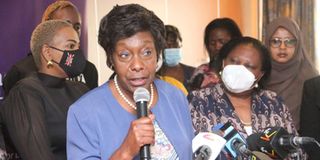Clear the road to 2022 elections for women, as from nominations

Kitui Governor Charity Ngilu addresses the press in Nairobi last year. She was among the three women elected governor in 2017.
If current indications are anything to go by, Kenya will have a record number of women elected in next year’s general election.
It is even more heartening to note the increasing number of women, progressively coming out to announce their intention to go for the top seat in the county — governorship.
It gets most inspiring that among these aspirants are women from some of the most conservative societies in the country, which are yet to elect a woman to Parliament — until the Constitution forced them to do so via the exclusive Woman Representative in 2013.
The idea that a woman in those deeply patriarchal communities can confidently declare their intention to vie against male opponents for such revered positions, and that the idea is embraced by the society, is huge progress towards flattening our uneven, jagged and bumpy political field.
In the 2017 General Election, three women were elected governor and a similar number senator. While the numbers were obviously low, it was historic as no woman was elected to the positions in the preceding 2013 polls — the first based on the 2010 Constitution.
Performed well
But, it was not a bad start, considering that some of the candidates, such as Prof Margaret Kamar, performed extremely well, coming second to Uasin Gishu Governor Jackson Mandago while running on ODM ticket in a passionately URP (Jubilee) zone. It was no surprise when the scientist and former university don decisively won the seat in 2017.
In the same boat were Ms Susan Kihika, then-Speaker of Nakuru County Assembly, and Ms Fatuma Dullo, then a nominated senator from Isiolo. The three made history along with Ms Joyce Laboso (deceased) of Bomet, Kitui’s Charity Ngilu and Anne Waiguru (Kirinyaga) as the only women senators and governors elected in 2017, respectively.
Things are looking up for our democracy. If the institutions and establishments tasked with ensuring that tenets of social equality and fairness in the electoral system are right and work as they should, then Kenyans will be assured of a just election next year.
That will, however, have to be reflected in the manner that political parties, specifically the ‘mainstream’ ones, pick their candidates, especially on the matter of gender parity.
Level playing field
For years, political parties have served as destroyers of women’s dreams to political office through unfair practices and discrimination that lock them out.
Some of the sticky concerns that must be addressed to safeguard a level playing field is a guarantee of a violence-free elections where women, like their male counterparts, will campaign and sell their political agenda without intimidation.
It was, therefore, reassuring and heartening when Kajiado police stood firmly with the indomitable MP Peris Tobiko, rejecting pressure and attempts from some seemingly powerful quarters to abort last Friday’s meeting presided over by Deputy President William Ruto, at which she launched her 2022 county governorship bid on the United Democratic Party ticket.
Intimidation such as that witnessed against the Kajiado East MP — the first woman from the Maasai community to be elected to a single-member constituency seat and now seeking to record another feat as governor— is unlikely to be the last. Women seeking to contest, especially the top seats, have to factor that in as they work on their strategies.
It is encouraging that some institutions are working towards guaranteeing a level playing field for all in the upcoming elections and beyond. The Media Council of Kenya, an independent national institution that sets media standards and good practice, for instance, in its newly reviewed “Guidelines for Election Coverage”, provides for gender inclusivity as well as diversity in the coverage of elections.
The guidelines, which reflect the tenets of the Code of Conduct for the Practice of Journalism in Kenya, as well as requirements of the Constitution and other laws, also require employers to take cognizance of the fact that female media practitioners face peculiar security risks due to their gender.
Ms Rugene, a consulting editor, is the founder of The Woman’s Newsroom Foundation. [email protected].





